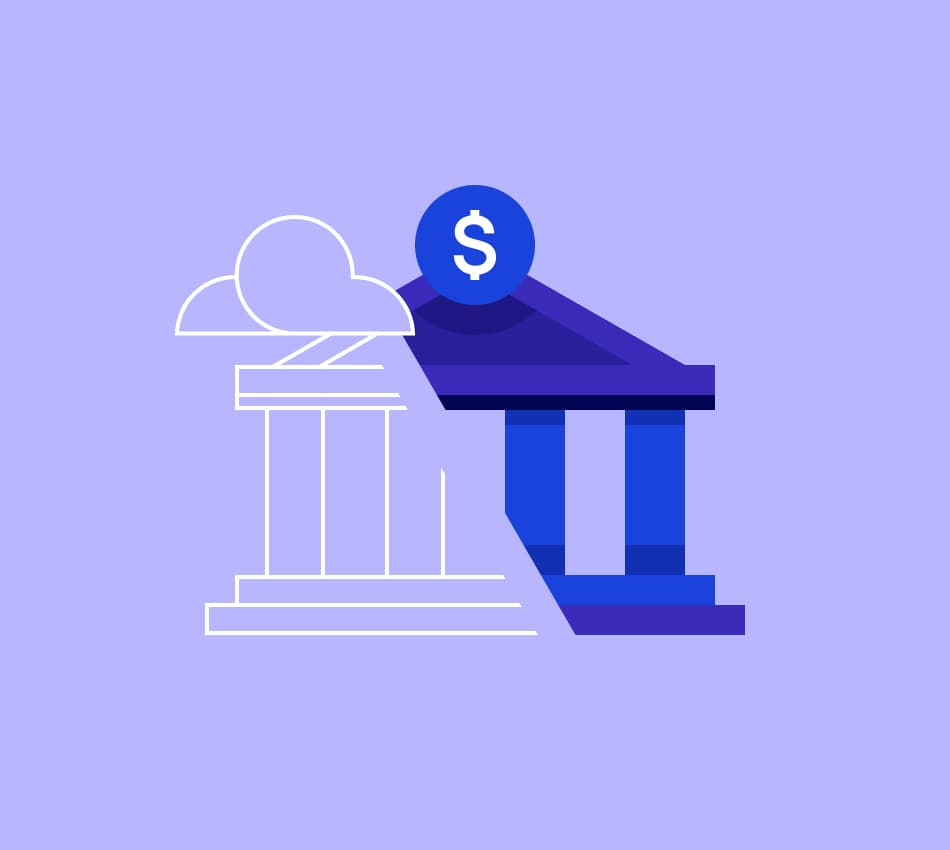In only about 15 years, fintechs have dramatically improved the ease of and access to financial services for business owners and consumers. These transformations happened so quickly that it’s easy to overlook some basic questions about what’s changed:
- What is a fintech company? How are they different from banks?
- Are fintechs regulated? Is your money safe with them?
- Why would you as a business owner trust a fintech with your money, instead of a traditional bank?
These are important questions, and ones that we take seriously. For example, Bluevine is not a bank—but we are the largest small business banking platform in the United States.BVSUP-00186 This is because, in some ways, being a fintech company gives us an edge over traditional banks, and we think that banking with a fintech can better fit the needs of small businesses.
But to help you decide what’s best for your business, let’s break down each of these questions step by step, and consider how you might power your business growth should you decide to use a fintech company.
What you need to know
- Fintech companies provide digital financial services, typically with lower fees and better digital tools than traditional banks, making them an attractive option for business owners.
- Fintechs and banks operate differently behind the scenes. Fintechs can be public or private businesses that partner with chartered banks to offer banking services.
- Before depositing funds with a fintech, you should verify that your fintech partners with an FDIC-insured bank.
What are fintechs?
Fintech refers to the use of digital technology to provide financial services. The word is a portmanteau of “financial technology,” and is pronounced FIN-teck, with a short ‘i.’ Any company that provides financial services primarily through digital tools is called a fintech company, or just “a fintech.” The fintech sector is broad, encompassing companies as varied as Bluevine, Klarna, PayPal, QuickBooks Online, Block, Venmo, and Coinbase.
Fintech companies have increased access to financial services for small business owners who had trouble accessing them with traditional institutions. Digital-forward banking platforms with user-friendly design have also made banking more convenient and intuitive for everyone, businesses included.
What types of fintechs are there, and what services do they offer?
Broadly, fintechs can be categorized as one or more of the following:
- Digital banking providers provide banking services like business checking and savings accounts, as well as debit and credit cards. There are typically fewer fees than at traditional banks, and the fees fintechs do charge are usually lower. Plus, you get a comprehensive digital experience and can access your account any time from your phone. Examples include Bluevine, Mercury, Novo, Relay, Chime.
- Business financing providers offer access to business financing like lines of credit, term loans, or credit cards, often with faster application reviews than traditional lenders—made possible by their use of technology during the review process. Examples include Bluevine, Lendio, and Enova.
- Accounting and bookkeeping platforms allow you to track expenses and manage invoices. You can also forecast cash flow and generate tax documents by syncing with your banking provider. Examples include QuickBooks Online and Xero.
- Invoicing and accounts payable platforms facilitate payments and transfers, and offer options for tracking and automating digital invoices and payments. Examples include Bluevine, AvidXchange, Melio, and Wave.
- Payment processors provide your customers with an interface to pay you, then facilitate their card payment, as well as other payment methods like digital wallet or ACH direct debit. Examples include PayPal, Square, and Stripe.
- Electronic trading and investment platforms give you the opportunity to invest your money in stocks, ETFs, options, cryptocurrencies, and more. Some platforms are even specific to crypto trading. Examples include Robinhood, Acorns, and Coinbase.
Fintechs vs. banks: What’s the difference?
Traditional banks and fintechs operate very differently, and you should know these differences before choosing where to keep your money.
| Fintechs | Banks | |
| What are they? | Private or public companies that provide specific financial services primarily or entirely through online platforms or apps. | Financial institutions that provide a full suite of financial services both in-person and online. |
| Where do their banking services come from? | Fintechs are typically not chartered banks. If they aren’t chartered, they’ll partner with a chartered bank and offer banking services through them. | Traditional banks are required to have a banking charter, which subjects them to state and federal regulations and direct oversight. |
| How do they make money? | While fintechs vary, they usually make money from interchange, subscriptions, and embedding their services into other product offerings. | Banks primarily make money from fees, interest payments, investing deposited funds, and providing wealth management services. |
How do fintech debit and credit cards work?
From your perspective, any debit or credit card you receive from a fintech company will work the same as one you receive from a traditional bank, with similar (or in some cases more) customization and spending tools, such as additional cards for employees and custom spending limits. Also, you’ll likely receive robust expense monitoring and have an easier time activating virtual cards.
Because fintechs don’t hold your funds themselves, your fintech debit card will be drawing from your funds held by the fintech’s partner bank. For example, Bluevine offers banking services and its debit card through Coastal Community Bank, Member FDIC, pursuant to a license from Mastercard International Incorporated.
Similarly, a fintech credit card works the same as a bank credit card, and your fintech may or may not report your credit activity to the three major business credit bureaus.
Did you know?
Bluevine makes it easy to build your business credit by reporting your line of credit and credit card repayment activity to Experian
Fintechs and FDIC insurance
When you bank with a non-chartered fintech, your financial services are actually being provided by the fintech’s one or more partner banks—if you deposit funds into a fintech’s business checking account, your funds are legally being held by the partner bank. As long as the partner bank is a “member FDIC,” the funds you deposit with your fintech are also FDIC-insured up to a certain amount. This means that your funds are protected up to that amount in case the partner bank fails.
The standard amount of FDIC insurance is up to $250,000 per depositor per FDIC-insured bank. Some fintechs, like Bluevine, offer additional FDIC protection through a sweep network, which distributes your deposits across multiple FDIC-insured banks to expand your coverage. If you have a business checking account through a fintech that uses a sweep network, you might enjoy FDIC insurance that goes well above the $250,000 standard amount.
Did you know?
Bluevine Business Checking accounts are FDIC insured up to $3 million per depositor through Coastal Community Bank, Member FDIC and their sweeps program banks by multiplying the standard $250,000 FDIC coverage across multiple banks.
If a fintech fails, your funds are still covered by FDIC insurance through the member FDIC partner bank(s). In that scenario, you would need to go directly to the partner bank(s) to access balances from any accounts you held through the fintech.
Any horror stories you’ve heard about fintech account holders not being able to access their money from a partner bank are likely a direct result of poor infrastructure and/or a poor reconciliation process. If your fintech and its partner bank have a strong relationship and prioritized knowing whose money is where, you shouldn’t have much to worry about.
Conclusion: Are fintechs better than traditional banks?
New or smaller business owners, especially those planning to scale, should strongly consider an online-only banking account, as these accounts can provide lower fees, a streamlined application process, and digital tools that help you save time and skip going to a branch. Fintechs can also be a lifeline for business owners living in rural and other areas underserved by brick-and-mortar banks.
If you’re an established business owner who’s looking to change banking providers and has easy access to bank branches, here are some guidelines for deciding whether a bank or fintech is best for you:
- If you’re looking for specialized financial services, a simplified and efficient banking experience, customization, and competitive fees and interest—or you live in an rural, underserved community—consider a fintech company.
- If you’re looking for a full range of financial services, a more conventional banking experience, standardization, and a closer relationship to your financial representative, consider a traditional bank.
FAQs
Is Bluevine a bank?
Bluevine is a financial technology company, not a bank. Our banking services are provided by Coastal Community Bank, Member FDIC. The Bluevine Line of Credit is issued by Celtic Bank.
Being a fintech company allows us to charge fewer and lower fees, and make our financial services more accessible to owners of new, small, or geographically remote businesses. Bluevine Business Checking accounts are also FDIC-insured up to $3,000,000 per depositor—12 times the standard amount of $250,000—through Coastal Community Bank and their sweeps program banks.
What’s the difference between a fintech and a bank?
While traditional banks and financial technology companies provide similar services, they operate differently behind the scenes:
- What are fintechs vs. traditional banks?
- Banks are chartered, regulated institutions that provide a full suite of financial services both in person and online.
- Fintechs are private or public companies that provide specialized financial services primarily or entirely through online platforms or apps.
- Who provides their banking services?
- Traditional banks are required to have a banking charter, which subjects them to state and federal regulations and direct oversight.
- While fintechs aren’t required to have charters, they instead usually offer banking services by partnering with a chartered bank. Fintechs are still subject to state and federal regulations and oversight.
- How do they make money?
- Traditional banks primarily make money from fees, interest payments, investing deposited funds, and providing wealth management services.
- While fintechs vary, they usually make money from interchange, subscriptions, and embedding their services into other product offerings.
Is it safe to bank with a fintech? Will my Bluevine deposits be FDIC-insured?
Yes, it is safe to bank with a fintech company, provided the fintech’s partner bank for the specific product is a “Member FDIC” bank.
When banking with a non-chartered fintech, your financial services are being provided by the fintech’s partner bank. For example, if you deposit funds into a fintech’s business checking account, your funds are legally being held by the partner bank. If the partner bank is FDIC-insured, the funds you deposit with your fintech are also FDIC-insured in case the partner bank or fintech fails. If the fintech fails, you would need to go directly to the partner bank to access your funds, which would still be FDIC-insured.
Bluevine accounts are FDIC-insured up to $3,000,000 per depositor—12 times the standard amount—through Coastal Community Bank, Member FDIC, by multiplying the standard $250,000 FDIC coverage across our program banks.
Bluevine also uses 256-bit encryption, multi-factor authentication, and biometric authentication to protect your account and financial information from data breaches.
If you’re not a bank, then how do Bluevine debit cards work?
The Bluevine Business Debit Mastercard® works the same as a debit card received from a traditional bank.
Your Bluevine debit cards come with extra management tools like additional cards for employees, custom spending limits, and Mastercard perks. You can manage all your Bluevine debit cards from your Bluevine dashboard and mobile app, and use the cards wherever Mastercard is accepted.
Who is Bluevine’s partner bank?
Bluevine’s banking services are provided by Coastal Community Bank, Member FDIC, and the Bluevine Line of Credit is issued by Celtic Bank.

